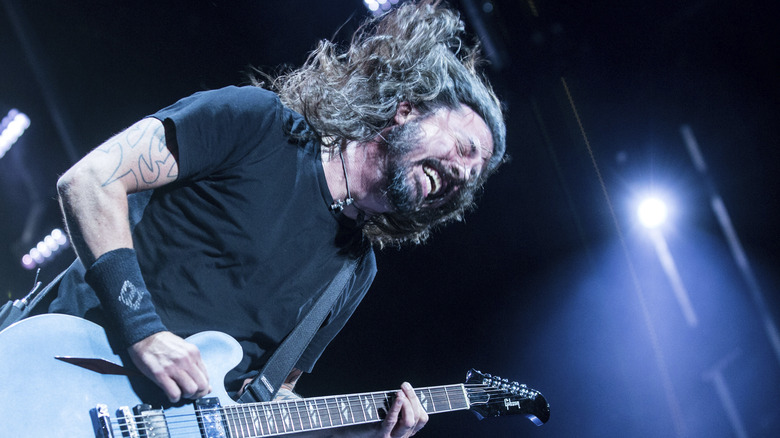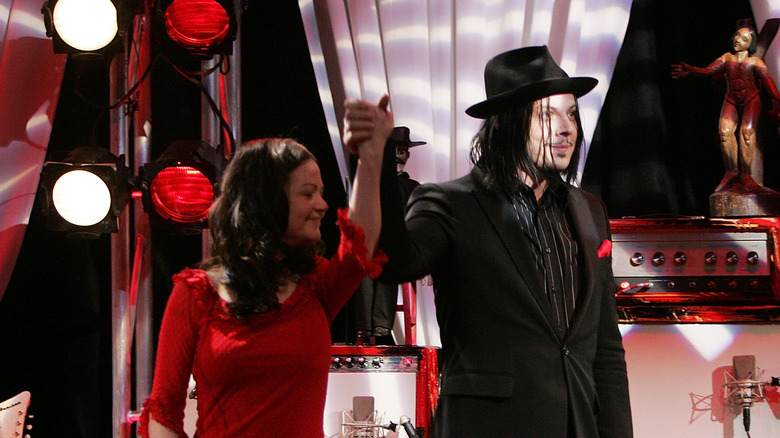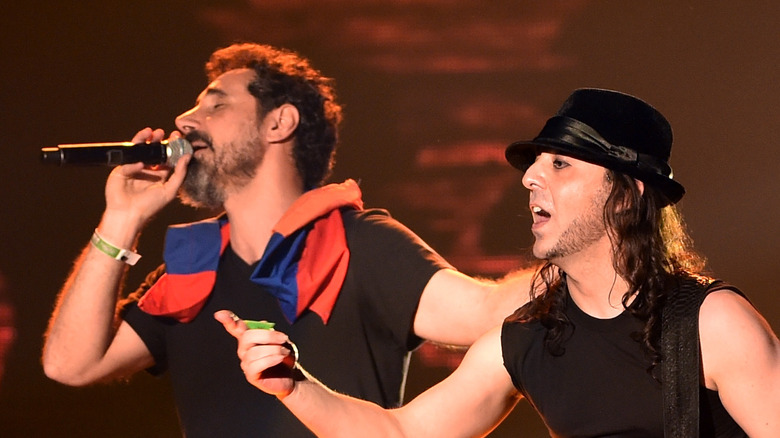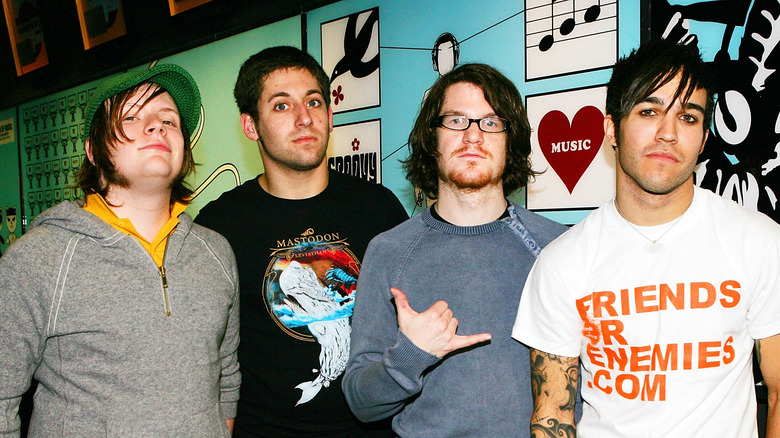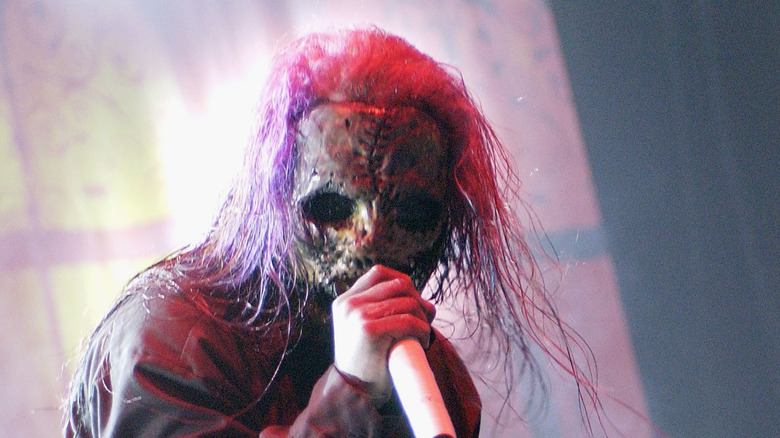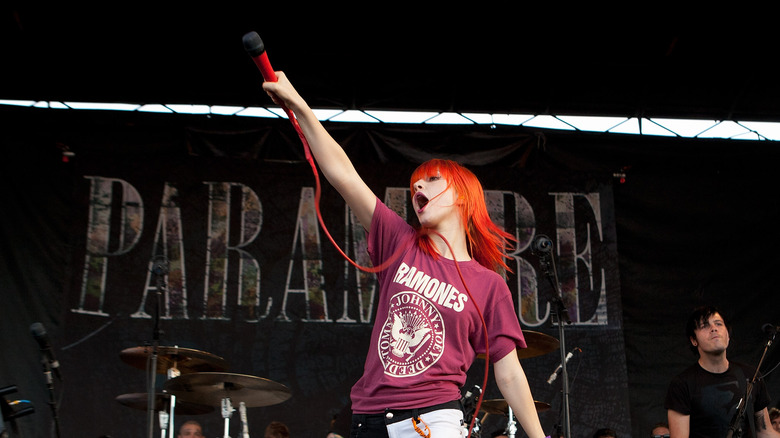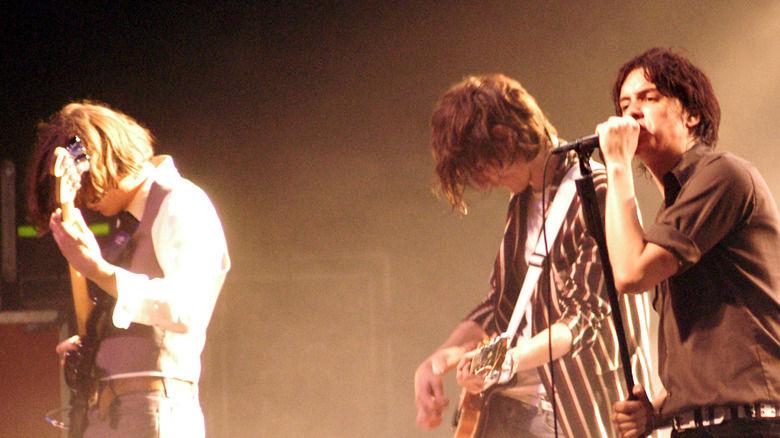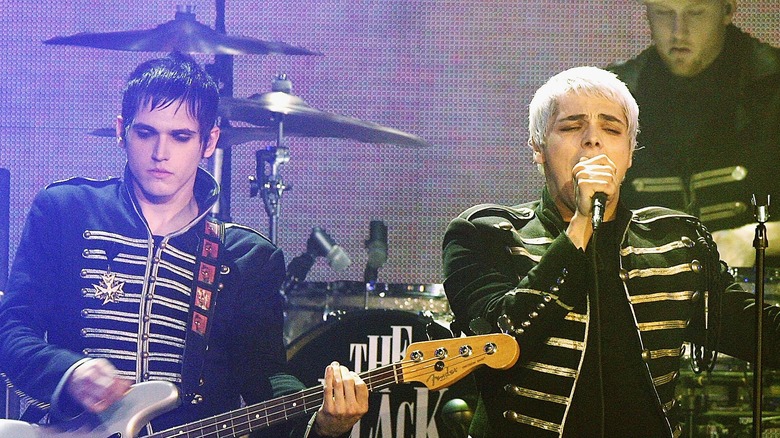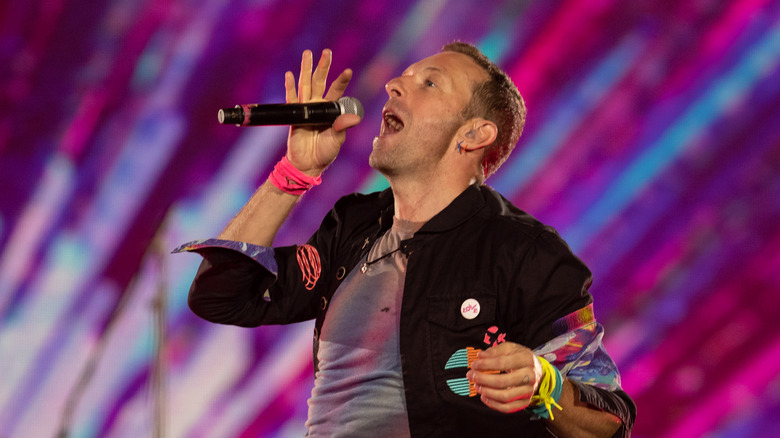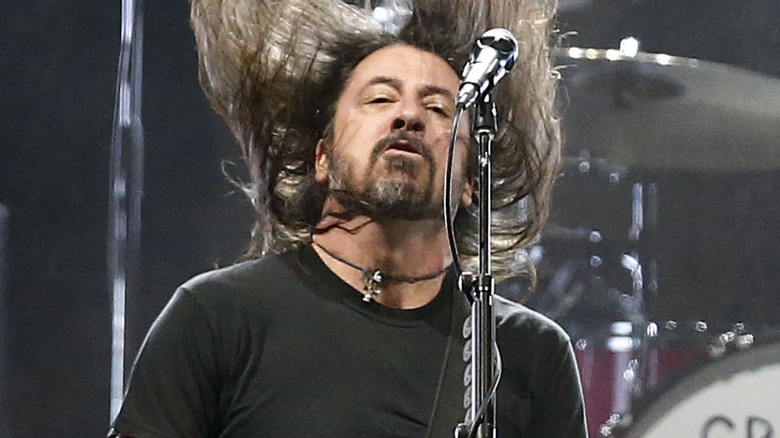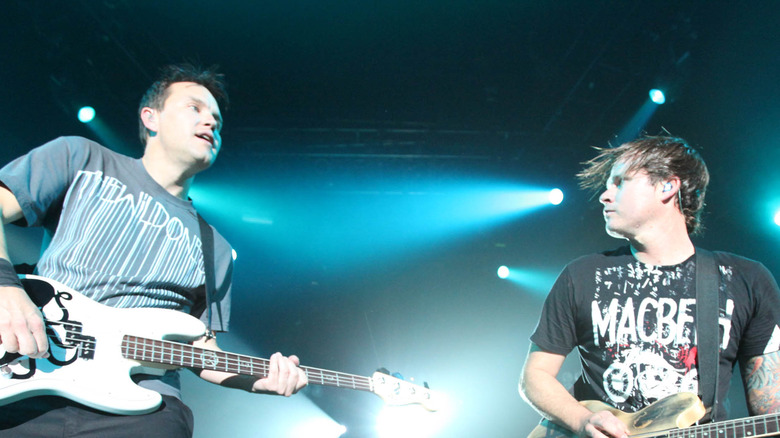The Most Important Rock Bands Of The 2000s
As bluntly put by Vice, rock music is dying — it might seem like the people saying otherwise are the ones picking up their kids from school, rather than the kids themselves. Rock had its time in the sun, but by the 2000s, rap and pop were starting to take over the mainstream charts.
Nonetheless, what might've been the genre's last great decade went out with a bang and plenty of fresh sounds. There were so many worthy bands, that tons of them — like Avenged Sevenfold, Evanescence, Sum 41, Arcade Fire, the Killers, Deftones, Muse, Queens of the Stone Age, 3 Doors Down, Death Cab for Cutie, Incubus, Maroon 5, Breaking Benjamin, the All American Rejects, Disturbed, Killswitch Engage, Underoath, and even Creed, Limp Bizkit and Nickelback (don't hate, you know you like at least some of their songs) just to name a few, couldn't fit on this list. Believe us, we tried. But that just means the garage, metal, indie, pop punk, and emo artists who did make the cut were too great to be denied entry. (Also, we didn't forget about Green Day or "American Idiot." Billie Joe and the gang are among the best artists of the '90s).
So put the kids down for a nap and bust out the eyeliner, ye aging millennials. From Paramore and The White Stripes to My Chemical Romance, Fall Out Boy, Slipknot, and Foo Fighters, these are the most important rock bands of the aughts.
The White Stripes
According to Nick Hasted over at Louder, the White Stripes not only made blues rock feel fresh — no small feat given how long it's been around — but gave the entire genre itself a much-needed shot in the arm in the early 2000s, helping return it to respectable prominence. "After all," Hasted writes, "at the turn of the century rock itself was widely written off, until The White Stripes' blues-based conviction helped resurrect it."
But it wasn't just their raw musical talent, or their uncanny ability to revisit a well-mined art form and find gems that countless other artists somehow missed, that has earned the "Seven Nation Army" rockers such widespread acclaim. Writing for Vanity Fair, Marc Spitz suggested that part of the band's enduring success was due to the fact that they remained relatable and down-to-earth, never losing sight of their garage-rock roots even after achieving widespread mainstream recognition. As Spitz described: "... They never lost that sense of being a people's band, a bedroom collector's outfit ... I can still remember receiving the "Elephant" promo. It was vinyl (of course) ... you could smell the must of the record shop shelf in the grooves."
They didn't use elaborate stage setups or have numerous backing vocalists, but rather relied on nothing but a guitar and drum kit — and the raw talent of Jack and Meg White. "Seeing them on the cover of Rolling Stone or selling out Madison Square Garden," Spitz writes, "felt like our triumphs."
System of a Down
Countless rock artists have used their music to speak truth to power. The Clash sang about the Spanish Civil War and the Bay of Pigs, according to The Conversation. Meanwhile, U2 is almost as famous for Bono's activism as it is for "The Joshua Tree," as per his interview with CBS, and Rage Against The Machine has always worn their politics on their sleeves (as if their name didn't give that away), per Britannica.
But nobody looking for political rockers should sleep on System of a Down, the Serj Tankian-fronted metal outfit that broke eardrums with 2001's "Toxicity," according to All Music, and who've used their tunes to boost political literacy since the beginning (even if you sometimes have to look up the lyrics to figure out what they're saying).
Writing for Vice, Emma Garland examines how the group's fun nu metal stylings ended up being a puzzlingly perfect vehicle for discussions on serious topics, such as the war on drugs, America's depressing incarceration rate, mistreatment of minority groups, and more.
Freddy, one of the people Garland spoke to for the article, sums it up quite nicely, saying, "When I heard Fred Durst yelling about hating authority in Limp Bizkit, my reaction was ... 'Blimey, this guy is crazy!' and it kind of stopped there. But with Serj Tankian it felt like he had all the facts, it wasn't just blind aggression ... there was more of a guiding ideology behind System of a Down's lyrics."
Fall Out Boy
Fall Out Boy struck mid-2000s pop punk gold with 2005's "From Under the Cork Tree" — spearheaded by such unforgettable hits as "Dance Dance" and "Sugar We're Goin' Down," according to All Music — and 2007's chart-topping "Infinity On High," with singles like "This Ain't A Scene, It's an Arms Race."
Yet Wentz, Patrick Stump, and the boys haven't been forgotten. In fact, in subsequent decades they started to get the respect they probably always deserved, yet which is rarely awarded to anyone when they're first getting big.
Over at the Punk Rock MBA (via YouTube), Finn McKenty says there were several factors that cemented Fall Out Boy's place in the annals of pop culture glory. They were in the right place at the right time to ride what he calls the "mall emo" wave of the mid-2000s, and business savvy enough to capitalize on that opportunity in a way many other groups never did. Despite their success and obvious talent, McKenty also says the guys were humble enough to respect each other and even accept outside songwriting help from time to time — something many artists are too proud to do, to their own detriment.
Slipknot
According to Decibel, nu metal — a fusion of heavy metal and hip hop — was a flash in the pan. Almost as quickly as it stormed the charts in the late 90s, the scary dreadlocked guys in Korn and the flatbrim-wearing dudebros in Limp Bizkit were yesterday's news. But not everyone who came up in that scene faded so quickly.
Slipknot, for example, has managed to stay relevant ever since their 2001 debut album "Iowa," which Pop Matters says put them on the map and had a humongous impact on 21st-century metal. As a result, Corey Taylor and the boys have been positioned to carry the heavy metal torch about as high as anyone else since the turn of the millennium, even winning NME's Best Metal Band In The World award in 2020, according to Guitar.
But what makes a band designed to be as unappealing as possible so successful? The awesomely frightening masks? You could argue that nobody's done it better, but Emma Garland at Vice notes that others, either with face paint like KISS or Immortal, or masks like GWAR or Nekrogoblikon, have still done it. Instead, Garland argues that what's kept Slipknot head and shoulders above their shock-rock peers is the fact that the rockers are just that good at what they do. Nobody's arguing that it's for everyone, but after numerous No. 1 albums spread over decades (per The New York Times), it's clearly not for no one, either.
Paramore
As Evanescence's Amy Lee related on social media (via Facebook), female-fronted rock groups often get overlooked or typecast as "girl bands." But in the early 2000s, artists like Lee were proving that women can do rock music just as well as anyone else, as described by Revolver.
A few years later, fiery-haired Hayley Williams and Paramore broke through with "Riot!" — a sophomore album packed with some of the catchiest emo slash pop-punk bangers of the decade, according to All Music. Many got hooked on the killer riff and irresistible chorus of "Misery Business," while "Crushcrushcrush" and "That's What You Get" became essential for any throwback emo night setlist.
But the group started switching things up as early as 2009's "Brand New Eyes." By the time they put out their self-titled fourth album in 2013, spearheaded by "Ain't It Fun" and "Still Into You," they had transformed into a sugary pop group. And yet, they were frustratingly good at it — the record debuted at the top of the charts and got rave reviews. This versatility has made Paramore highly influential, and not just among other rockers who swam in their wake throughout the late 2000s and 2010s. Pitchfork says everyone from Lil Uzi Vert to pop megastars like Billie Eilish and Olivia Rodrigo have taken cues from the "Decode" rockers.
The Strokes
Rolling Stone hated Led Zeppelin when they first came out, and the critics despised Black Sabbath too, per Loudwire. The LA Times even has embarrassing receipts of reviewers panning the Beatles in 1964. But occasionally, critics recognize greatness before hindsight forces them to. When they debuted with 2001's "Is This It," indie rockers The Strokes were immediately recognized as something different and damn good, according to reviews on Metacritic.
As Far Out Magazine points out, the praise hasn't waned in the years since, with their debut album being held as pre-eminent amongst its rock and roll peers for two decades since, stating: "The bands and musicians that it inspired, the effect the members themselves had on fashion and culture, the cross-continental acclaim, the endless critical praise, and now the numerous retrospectives solidifying its divinity can all be cited as evidence."
The album's impact has even been compared to the genre-busting changes that occurred over a decade earlier, as Far Out Magazine elaborated: "Just as grunge had ostensibly wiped out the hair metal faction of the late '80s, The Strokes immediately rendered nu-metal bands and rap-rock clowns as terminally uncool."
My Chemical Romance
My Chemical Romance was formed by frontman Gerard Way after the September 11 attacks in 2001, and released its debut album the following year, according to All Music. Fame and fortune found them two years later after making waves in the underground scene, although critics were lukewarm.
But since then, the conversation has changed. The opening piano notes of "Welcome To The Black Parade," one of many killer tracks from the band's finest hour, 2006's "The Black Parade" (which Rolling Stone listed as one of the greatest albums of all time), have become as iconic as just about any song intro ever. In its write-up on the album, which features bangers like "Teenagers" and "Famous Last Words," Rolling Stone says Gerard Way is the new David Bowie and favorably compared the record to other legendary rock operas like The Who's "Tommy" and Pink Floyd's "The Wall."
Writing for The Ringer, Rob Harvilla charts the band's curious journey from emo underdogs dismissed by the elites to the status of, in his words: "One of the greatest rock bands of the 21st century." Harvilla says the band combined a larger-than-life persona with emotional closeness in an unforgettable way that spoke to millions of disaffected kids, stating: "MCR was born in an apocalypse, and designed to help us all survive it ... We are all bandwagoners on the Black Parade now."
Coldplay
Dreamy stadium rock has been supplied amply by such bands as U2 since the '80s (per Britannica), and while the Irish megaband hasn't hung up the mics and drums just yet, eventually they might decide to call it a day. Luckily for them, and us, there's already a well-honed and worthy successor to pass the torch to.
Coldplay might be a little soft for fans of heavier rock music, but we defy you not to rock out to the opening piano riff on "Clocks," or belt out every word of "Fix You" at the top of your lungs. According to Udiscovermusic, it's hard to argue that Chris Martin and the boys in Coldplay haven't written some enviably gorgeous melodies since their debut "Parachutes" hit shelves in 2000, and the award-winning record checks every box you'd want for future stadium-packing superstars.
More than two decades later, the soft yet huge style of rock they popularized sounds as crisp and fresh as ever: According to Funktasy, the group has outlasted and outgunned rival pop groups for years, and is still capable of collaborating with hot artists like the Chainsmokers and Beyonce to produce chart-topping hits.
Foo Fighters
This one is almost cheating, since the Foo Fighters, fronted by former Nirvana drummer Dave Grohl, started making big waves in the '90s with albums like their eponymous 1995 debut and 1997's "The Colour and the Shape" (per All Music). But the full weight of their impact didn't hit home until the 21st century, during which time they evolved from defiant, roaring upstarts to beloved elder statesmen of dad rock on the back of a series of acclaimed, hit-packed records.
According to The New York Times, the Foo's enduring relevance and touring success is all the more impressive since their brand of riff-heavy rock hasn't been the hottest sound with the youth in decades. Nonetheless, Grohl's endless charisma is responsible for keeping the band top of the list when events such as charity gigs or awards ceremonies are being planned, requiring their signature sound described by The New York Times as "rock music with joy and gravitas."
And if you still don't think the "Monkey Wrench," "Everlong," and "Learn to Fly" rockers garner mainstream attention today, just check out USA Today's list of the celebs who came out to celebrate drummer Taylor Hawkins after his tragic 2022 death. Everyone from Pink to Miley Cyrus to Elton John and Metallica showed up to send the beloved golden-haired stickman out with a bang — and he wasn't even the frontman.
Blink-182
With a healthy dose of humor and self-awareness, guitarist and vocalist Tom DeLonge, co-frontman and bassist Mark Hoppus, and drumming superstar Travis Barker — the three dudes in SoCal pop-punk trio Blink-182 — engaged us with some of the catchiest turn-of-the-millennium anthems in the genre. From "What's My Age Again?" and "All The Small Things," to "First Date," "I Miss You," and "Feeling This," they left a massive, still-smoking, asteroid-crater-sized impact on the world of rock and pop, per Sound Digest.
The band's visionary stylistic fingerprints can be found on just about every pop-punk track of the 21st century. In other words, a world without Blink is one without Panic! At The Disco, All Time Low, and just about every other band where the members wore Dickie shorts that swung past their knees and spiked their hair with way too much gel.
The guys in Blink are no strangers to infighting, though, with Tom DeLonge quitting twice due to competing priorities and incompatible artistic visions, according to Sound Digest. But NPR says he's back in the fold as of 2022, and that these irreverently silly songwriting masterminds are finally putting out new material. You can even catch them on tour — although, as Vice points out, the days of being able to see them for reasonable prices appear to be long gone.
Linkin Park
Some artists hit their stride two or three albums in, such as Green Day's third-time-lucky breakthrough "Dookie" (via Britannica). But Linkin Park, the barrier-breaking, Chester Bennington and Mike Shinoda-fronted nu metal outfit, had their biggest hit right at the starting line — after only a few short years of name changes and getting the lineup situated, per All Music. This was 2000's "Hybrid Theory," a seismic debut album packed with angsty earworm smashes like "One Step Closer," "Crawling," and "In The End" — all iconic and instantly recognizable rock songs of the decade.
Proving they weren't a one-hit wonder, the band followed this up with equally successful singles from 2003's "Meteora," like "Numb," "Somewhere I Belong," and "Faint." Then, 2007's "Minutes to Midnight" gave us hits like "What I've Done" and "Bleed It Out." Suffice to say, these guys found a winning sound that their peers, such as Korn, had been laying the foundation for, and became possibly the biggest thing to happen to rock in a decade (per Stereogum).
According to Buzzfeed News, the band not only made killer tunes, but also made it okay for angst-ridden and frustrated young people to express their feelings through music, rather than destructively bottling it up. And in doing so, they made an entire generation feel a little less alone.
